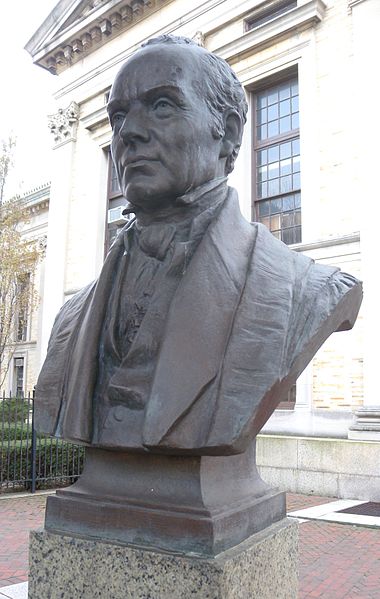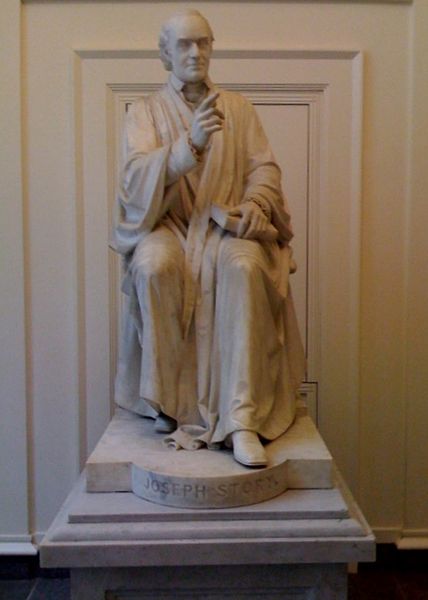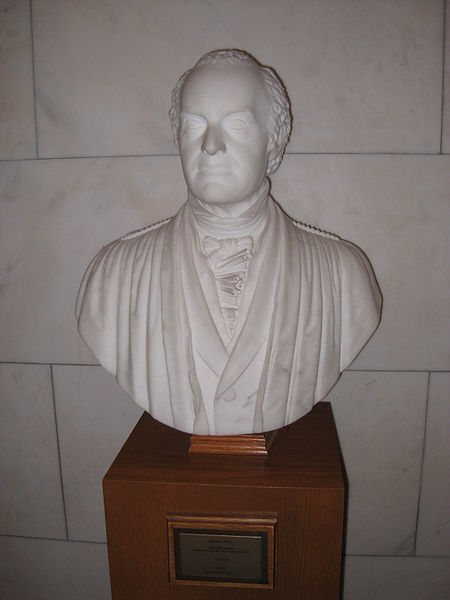<Back to Index>
- Anthropologist Clark Wissler 1870
- Composer Alberto Franchetti, 1860
- Associate Justice of the Supreme Court Joseph Story, 1779
PAGE SPONSOR
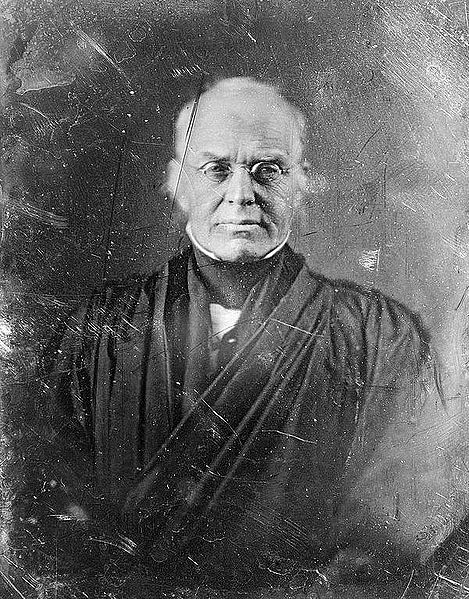

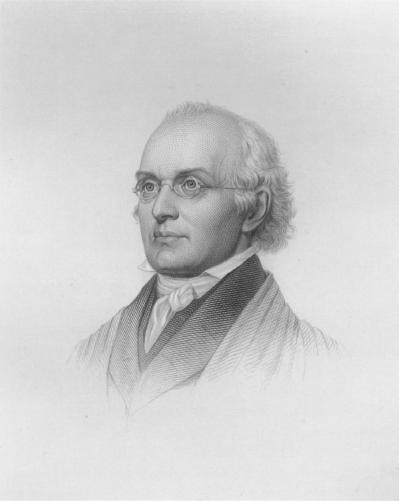
Joseph Story (September 18, 1779 – September 10, 1845) was an American lawyer and jurist who served on the Supreme Court of the United States from 1811 to 1845. He is most remembered today for his opinions in Martin v. Hunter's Lessee and The Amistad, along with his magisterial Commentaries on the Constitution of the United States, first published in 1833. Dominating the field in the 19th century, this work is one of the chief cornerstones of early American jurisprudence. It is the first comprehensive treatise ever written on the U.S. Constitution, and remains a great source of historical information of the formation and early struggles to define the American republic. It also is organized in a way antithetical to modern books on the subject; rather than starting with judicial review and leapfrogging to areas of main interest, Story methodically goes through the Constitution phrase by phase, covering topics most other constitutional commentaries ignore.
Story had opposed Jacksonian democracy and said
it was "oppression" of property rights by republican
governments when popular majorities in the 1830s began
to restrict and erode the property rights of the
minority of rich men. Newmyer (1985) presents Story as
a "Statesman of the Old Republic" who tried to be
above democratic politics and to shape the law in
accordance with the republicanism of Story's heroes, Alexander Hamilton and John Marshall, as well as the New
England Whigs of the 1820s and 1830s such as Daniel Webster. Historians
agree that Justice Story – as much or more than
Marshall or anyone else – did indeed reshape American
law in a conservative direction that protected
property rights.
Story was born at Marblehead, Massachusetts. His father was Dr. Elisha Story (1743 – 1805), a member of the Sons of Liberty who took part in the Boston Tea Party in 1773. Doctor Story moved from Boston to Marblehead during the war. His first wife, Ruth (née Ruddock) soon died, leaving children, and Story remarried in November, 1778, to Mehitable Pedrick, nineteen, the daughter of a wealthy shipping merchant who would lose most of his fortune during the Revolutionary War. Joseph was the first - born of the many children of this second marriage.
As a boy, Joseph Story studied at the Marblehead Academy until the fall of 1794 when his father withdrew him from school because the schoolmaster, William Harris (later president of Columbia University), beat Story for some minor offense. On his second attempt, Story was accepted at Harvard University in January, 1795, with the class of 1798. At Harvard, he was an excellent and well behaved student and was a member of Phi Beta Kappa. After graduating second in his class, he read law in Marblehead under Samuel Sewall, then a congressman and later chief justice of Massachusetts. He later read law under Samuel Putnam in Salem.
He was admitted to the bar at Salem, Massachusetts, in 1801. As the only lawyer in Essex County aligned with the Jeffersonian Democratic - Republicans, he was hired as counsel to the powerful Republican shipping firm of George Crowninshield & Sons. He was a poet as well and published "The Power of Solitude" in 1804, one of the first long poems by an American. In 1805 he was elected to the Massachusetts House of Representatives, where he served until 1808, when he succeeded a Crowninshield to become one of Essex County's representatives in Congress, serving from December 1808 to March 1809, during which he led the successful effort to put an end to Jefferson's Embargo against maritime commerce. He re-entered the private practice of law in Salem and was again elected to the state House of Representatives, which he served as Speaker in 1811.
Story's young wife, Mary F.L. Oliver, died in
June 1805, shortly after their marriage and two months
after the death of his beloved father. In August,
1808, he married Sarah Waldo Wetmore, the daughter of
Judge William Wetmore of Boston. They would have seven
children, though only two, Mary and William Wetmore Story, survived to
adulthood. Their son became a noted poet and sculptor
(his bust of his father is in the entrance to the
Harvard Law School Library) who would publish The
Life and Letters of Joseph Story.
In November 1811, at the age of thirty - two, Story became the youngest Associate Justice of the Supreme Court of the United States. He was nominated by President James Madison on November 15, 1811, to a seat vacated by William Cushing, and was confirmed by the United States Senate, and received his commission, on November 18, 1811. Story remains the youngest Supreme Court Justice at appointment. Here he found a congenial home for the brilliance of his scholarship and the development and expression of his political philosophy.
Soon after Story's appointment, the Supreme Court began to bring out into plain view the powers which the United States Constitution had given it over state courts and state legislation. Chief Justice John Marshall led this effort, but Story had a very large share in the remarkable decisions and opinions issued from 1812 until 1832. For instance, Story wrote the opinion for a unanimous court in Martin v. Hunter's Lessee following Marshall's recusal. He built up the department of admiralty law in the United States federal courts; he devoted much attention to equity jurisprudence and the department of patent law. In 1819 he attracted much attention by his vigorous charges to grand juries denouncing the slave trade, and in 1820 he gave a public anti - slavery speech in Salem and was prominent in the proceedings of the Massachusetts Convention called to revise the state constitution.
Non - lawyers are most likely to be familiar with Story's 1841 opinion in the case of United States v. The Amistad, which was the basis for a 1997 movie directed by Steven Spielberg. Story was played by an actual retired Supreme Court justice, Harry Blackmun.
In 1829 he moved from Salem to Cambridge and became the first Dane Professor of Law at Harvard University, meeting with remarkable success as a teacher and winning the affection of his students, who had the benefit of learning from a sitting Supreme Court judge. He was a prolific writer, publishing many reviews and magazine articles, delivering orations on public occasions, and publishing books on legal subjects which won high praise on both sides of the Atlantic.
Justice Story was one of the
most successful American authors of the first half
of the 19th Century. "By the time he turned 65, on
September 18, 1844, he earned $10,000 a year from
his book royalties. At this point his salary as
Associate Justice was $4,500."
Mount Auburn Cemetery was dedicated at a civic celebration in 1831. One of the principal speakers at the cemetery's opening was Associate Justice Joseph Story. He is buried there "as are scores of America's celebrated political, literary, religious, and military leaders. His grave is marked by a piece of sepulchral statuary executed by his son, William Wetmore Story."
Story died at home in Cambridge in 1845.
Story County, Iowa was named
in his honor, as was Story Hall, a dormitory at Harvard Law School, and the DePaul University College of Law chapter
of the legal fraternity, Phi Alpha Delta.
- "The Constitution unavoidably deals in general language. It did not suit the purposes of the people, in framing this great charter of our liberties, to provide for minute specifications of its powers, or to declare the means by which those powers should be carried into execution. It was foreseen that this would be a perilous and difficult, if not an impracticable, task. The instrument was not intended to provide merely for the exigencies of a few years, but was to endure through a long lapse of ages, the events of which were locked up in the inscrutable purposes of Providence." Martin v. Hunter's Lessee, 14 U.S. 304 (1816)
- "The patent act uses the phrase 'useful invention' merely incidentally. . . . All that the law requires is, that the invention should not be frivolous or injurious to the well - being, good policy, or sound morals of society. The word 'useful,' therefore, is incorporated into the act in contradistinction to mischievous or immoral. For instance, a new invention to poison people, or to promote debauchery, or to facilitate private assassination, is not a patentable invention. But if the invention steers wide of these objections, whether it be more or less useful is a circumstance very material to the interests of the patentee, but of no importance to the public. If it be not so extensively useful, it will silently sink into contempt and disregard." Lowell v. Lewis, 15 F. Cas. 1018 (C.C.D. Mass. 1817)
